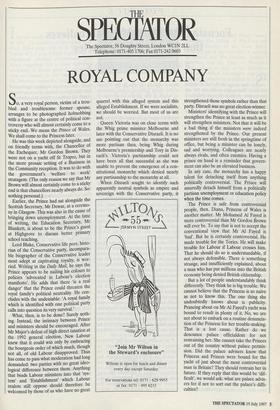The Spectator, 56 Doughty Street, London WC1N 2LL Telephone: 0171-405
1706; Fax 0171-242 0603
ROYAL COMPANY
So, a very royal person, victim of a trou- bled and troublesome former spouse, arranges to be photographed hobnobbing with a figure at the centre of political con- troversy who will almost certainly come to a sticky end. We mean the Prince of Wales. We shall come to the Princess later.
He was this week depicted alongside, and on friendly terms with, the Chancellor of the Exchequer, Mr Gordon Brown. They were not on a yacht off St Tropez, but in the more prosaic setting of a Business in the Community reception. It was to do with the government's 'welfare to work' stratagem. (The only reason we say that Mr Brown will almost certainly come to a sticky end is that chancellors nearly always do. So: nothing personal.) Earlier, the Prince had sat alongside the Scottish Secretary, Mr Dewar, at a ceremo- ny in Glasgow. This was also in the cause of bringing down unemployment. At the time of writing, the Education Secretary, Mr Blunkett, is about to be the Prince's guest at Highgrove to discuss better primary school teaching. Lord Blake, Conservative life peer, histo- rian of the Conservative party, incompara- ble biographer of the Conservative leader most adept at captivating royalty, is wor- ried. Writing in the Daily Mail, he says the Prince appears to be nailing his colours to policies 'advocated in Labour's election manifesto'. He adds that there 'is a real danger' that the Prince could threaten the royal family's political neutrality. He con- cludes with the undeniable: 'A royal family which is identified with one political party calls into question its very survival.' What, then, is to be done? Surely noth- ing. Instead, the intimacy between Prince and ministers should be encouraged. After Mr Major's defeat of high direct taxation at the 1992 general election, New Labour knew that it could win only by embracing the bourgeois order of which much, though not all, of old Labour disapproved. Thus has come to pass what moderation had long demanded: two parties with no great ideo- logical difference between them. Anything that binds Labour ministers into that 'sys- tem' and 'Establishment' which Labour zealots still oppose should therefore be welcomed by those of us who have no great quarrel with this alleged system and this alleged Establishment. If we were socialists, we should be worried. But most of us are not.
Queen Victoria was on close terms with the Whig prime minister Melbourne and later with the Conservative Disraeli. It is no use pointing out that the monarchy was more partisan then, being Whig during Melbourne's premiership and Tory in Dis- raeli's. Victoria's partisanship could not have been all that successful as she was unable to prevent the emergence of a con- stitutional monarchy which denied nearly any partisanship to the monarchy at all.
When Disraeli sought to identify such apparently neutral symbols as empire and sovereign with the Conservative party, it strengthened those symbols rather than that party. Disraeli was no great election-winner.
Ministers' identifying with the Prince will strengthen the Prince at least as much as it will strengthen ministers. Not that it will be a bad thing if the ministers were indeed strengthened by the Prince. Our present ministers are still fresh in the springtime of office, but being a minister can be lonely, sad and worrying. Colleagues are nearly always rivals, and often enemies. Having a prince on hand is a reminder that govern- ment can also be an elevated business.
In any case, the monarchy has a happy talent for detaching itself from anything politically controversial. The Prince will assuredly detach himself from a politically partisan unemployment or education policy when the time comes.
The Prince is safe from controversial people, then. Diana, Princess of Wales is another matter. Mr Mohamed Al Fayed is more controversial than Mr Gordon Brown will ever be. To say that is not to accept the conventional view that Mr Al Fayed is `bad'. But he is certainly controversial. He made trouble for the Tories. He will make trouble for Labour if Labour crosses him. That he should do so is understandable, if not always defensible. There is something strange, and insufficiently explained, about a man who has put millions into the British economy being denied British citizenship. But a lot of people understandably think differently. They think he is big trouble. We cannot believe that the Princess is so naive as not to know this. The one thing she undoubtedly knows about is publicity. Prancing about on Mr Al Fayed's yacht was bound to result in plenty of it. No, we are not about to embark on a routine denuncia- tion of the Princess for her trouble-making. That is a lost cause. Rather do we denounce palace officialdom for not restraining her. She cannot take the Princes out of the country without palace permis- sion. Did the palace advisers know that Princess and Princes were bound for the yacht of just about the most controversial man in Britain? They should restrain her in future. If they reply that this would be 'dif- ficult', we would ask: what are palace advis- ers for if not to sort out the palace's diffi- culties?


























































 Previous page
Previous page